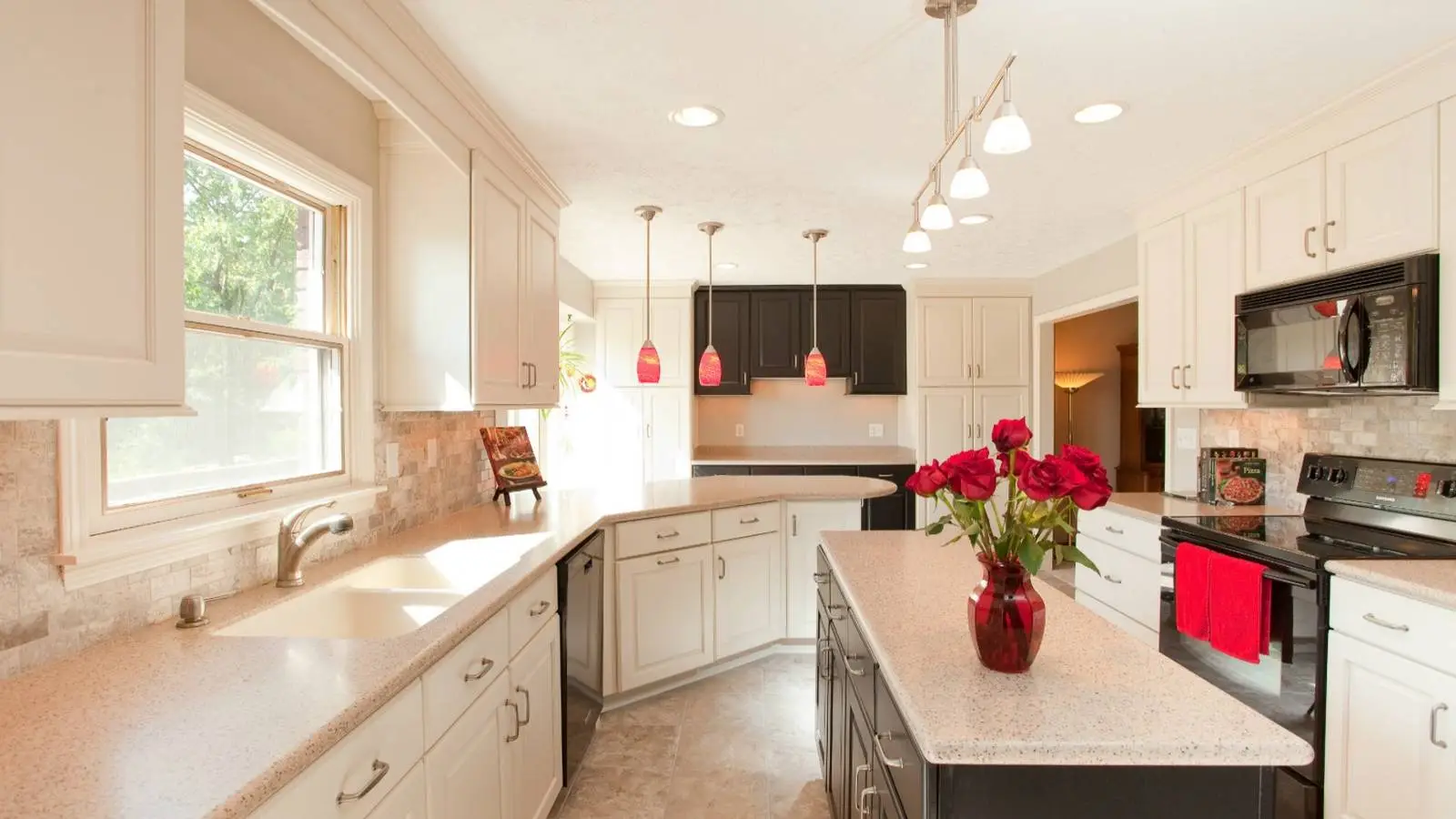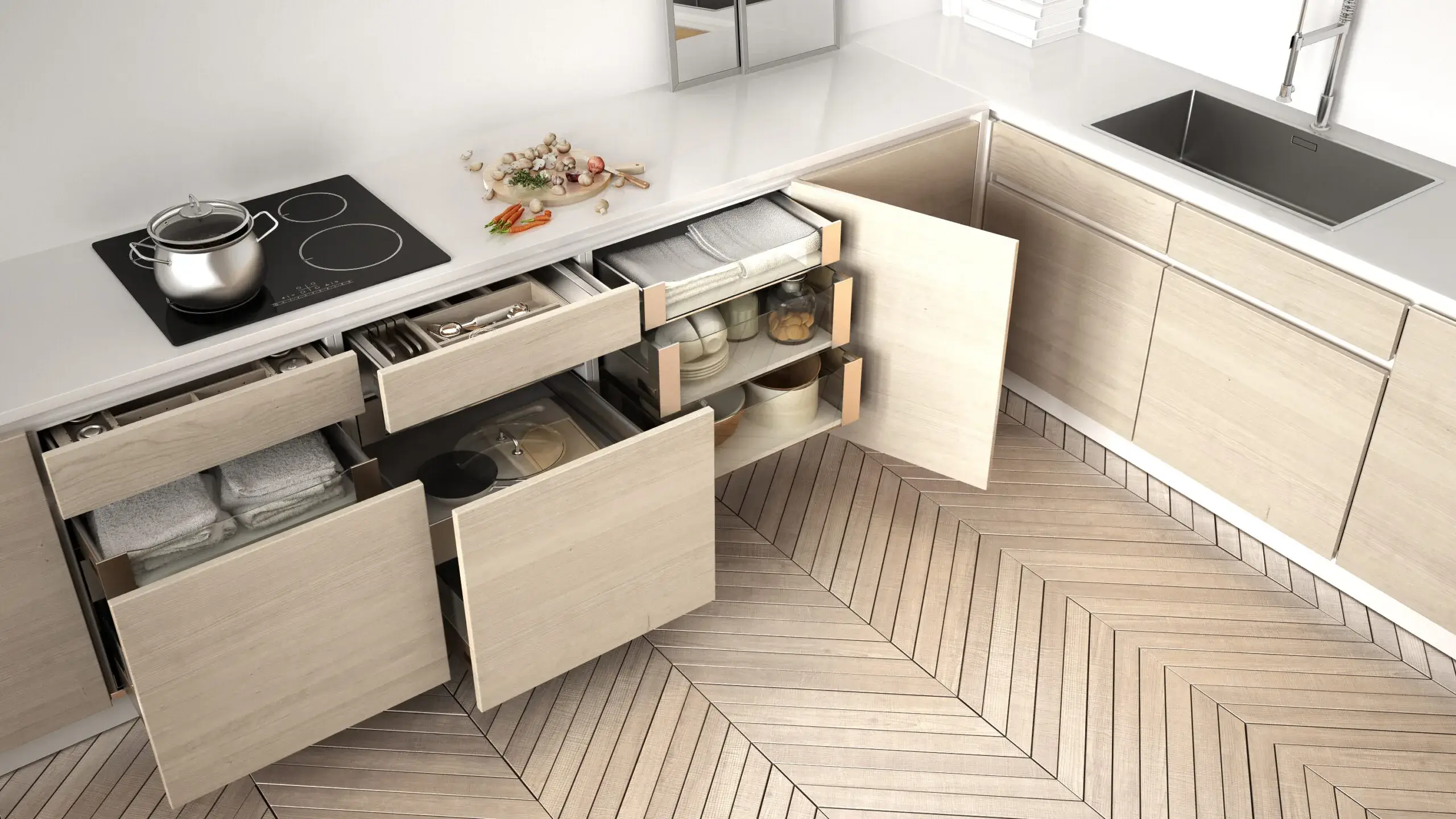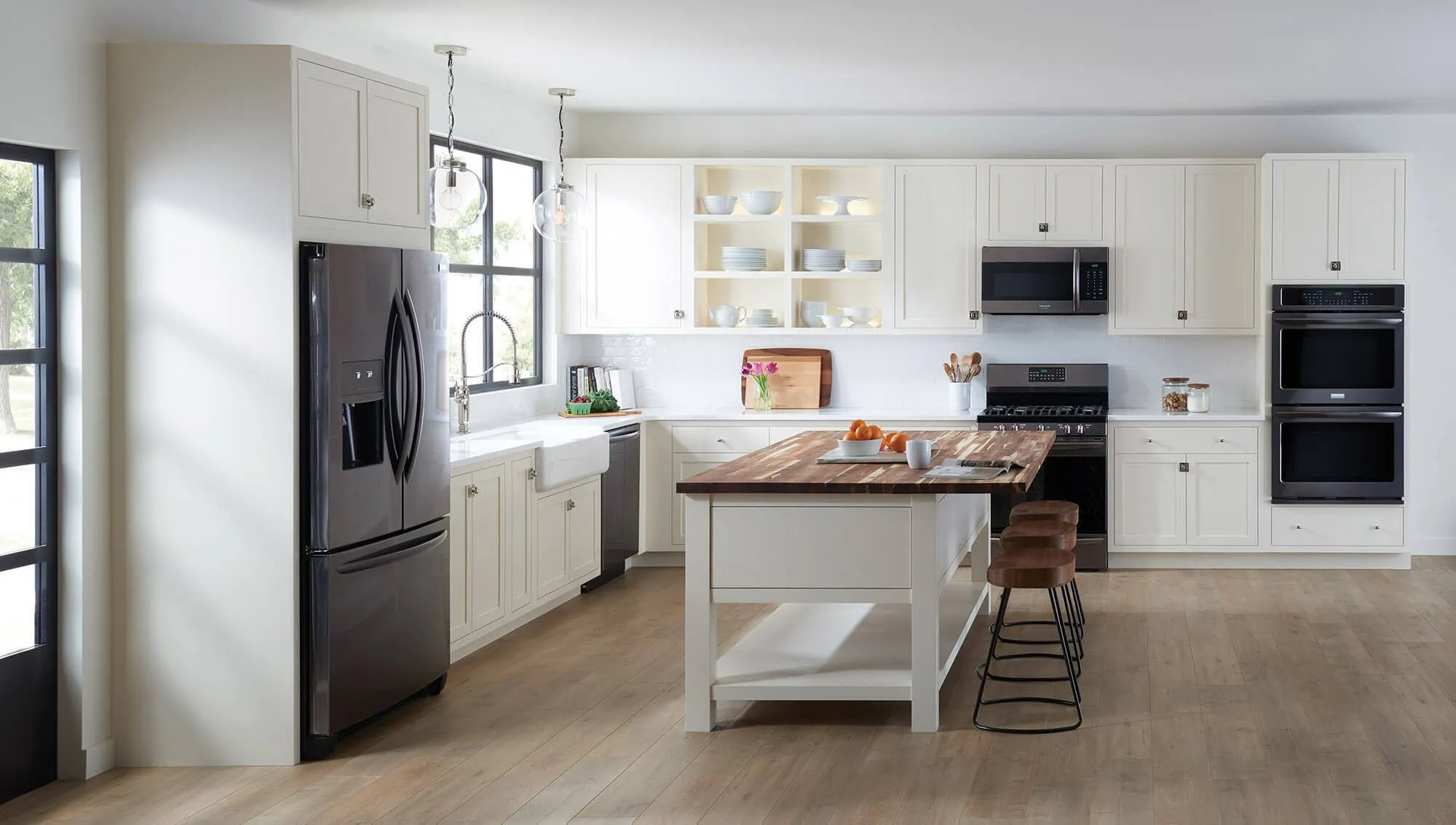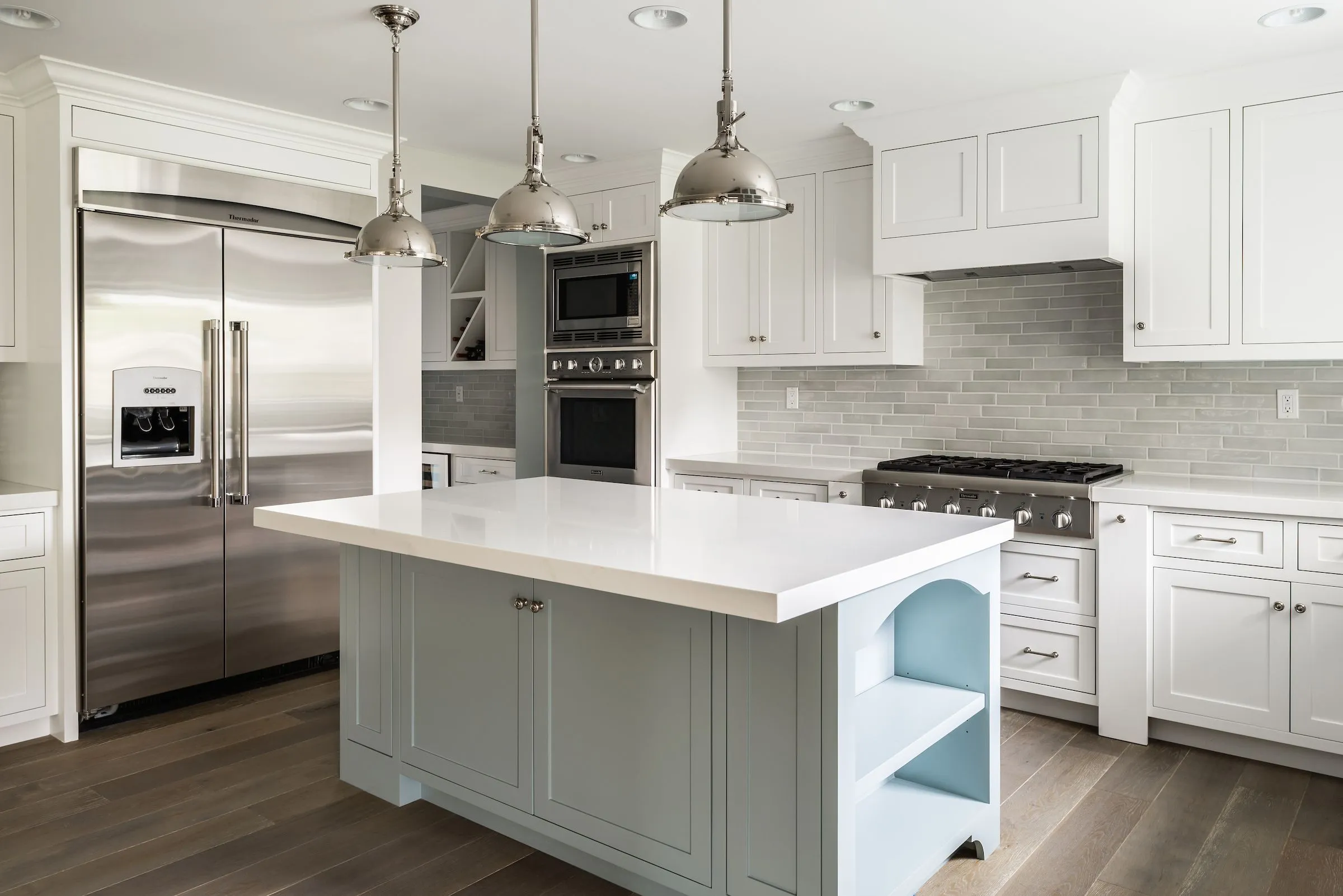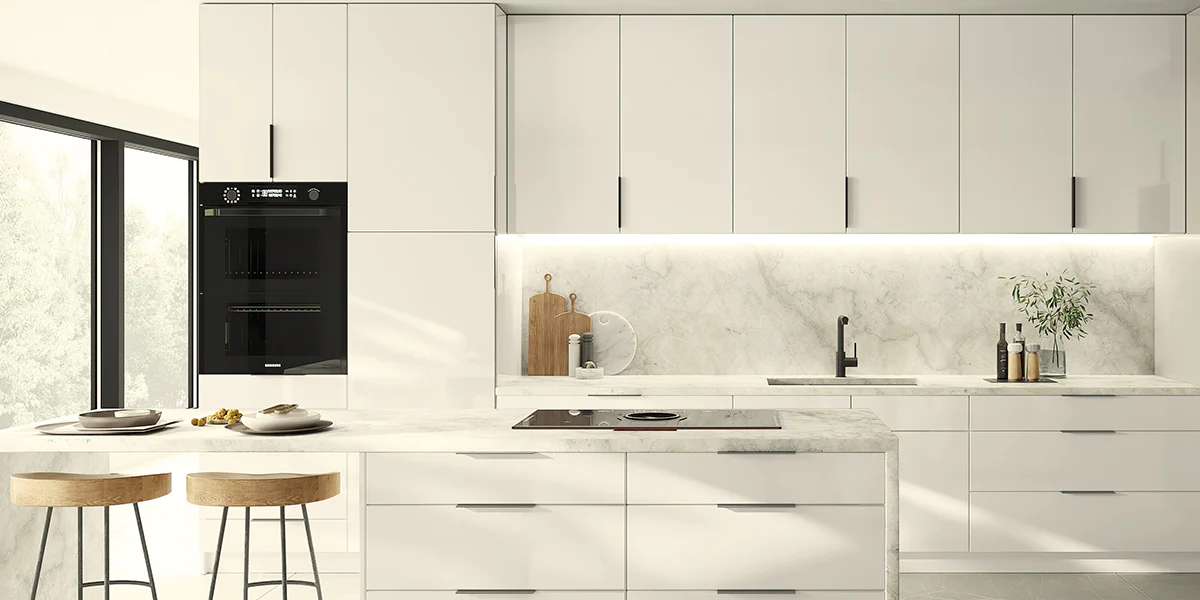In the kitchen countertop design trend where every detail matters, the kitchen worktop thickness is quite crucial. From granite and quartz to marble, you will need to discover the ideal thickness for your modern kitchen. It not only affects their appearance but also their durability and functionality.
Experience the exceptional service and superior craftsmanship that have made Columbus Cabinet City a trusted name in the industry. In this comprehensive guide, we will delve into the latest trends and considerations for kitchen countertop thickness trends, focusing on the popular materials of granite, quartz, and marble. Whether you’re aiming for a high-end, contemporary look or timeless elegance, understanding will help you achieve the desired aesthetic for your modern kitchen.
Granite: Striking Beauty with Varying Thicknesses
Granite has long been admired for its natural beauty and durability. It offers a wide range of design possibilities, and the choice of thickness can greatly impact its visual appeal. Let’s explore the design and styles associated with granite countertops and the recommended kitchen countertop thickness trend options.
Design and Styles for a Sense of Elegance:
Granite countertops exude a sense of timeless elegance and can enhance both traditional and modern kitchen designs. The natural variations in color and pattern found in granite make each slab unique. From subtle whites and grays to bold blacks and vibrant hues, there’s a kitchen countertop thickness granite slab to suit every style preference.
When it comes to kitchen countertop thickness trends, granite countertops are commonly available in two options: 2 cm (approximately 3/4 inch) and 3 cm (approximately 1 1/4 inches). The choice of thickness depends on the desired aesthetic and the structural requirements of your kitchen.
Recommended Thickness:
For a sleek and modern look, many homeowners opt for the 3 cm thickness. This kitchen countertop thickness trends allows the natural beauty of granite to shine, showcasing its striking patterns and colors. The thicker slab adds visual weight and presence to the overall design, creating a statement piece in your kitchen.
On the other hand, 2 cm granite countertops are often used for more traditional or cost-conscious designs. While they offer the same beauty and durability as their thicker counterparts, 2 cm granite may require additional support, such as plywood backing or a substructure, to ensure stability.
Quartz: Versatility and Consistency in Thickness
Quartz has gained immense popularity in recent years due to its durability, low maintenance, and versatile design options. Unlike natural stone, quartz countertops offer consistent patterns and colors, allowing for a cohesive look. Let’s delve into the design and recommended thickness options for quartz countertops.
Design and Styles for Contemporary Appearance:
Quartz countertops have a sleek and contemporary appearance, making them suitable for various kitchen styles, from minimalist to industrial. With its engineered composition, quartz can be manufactured in a wide range of colors, patterns, and finishes. Whether you prefer a solid hue, a marble-like veining, or a unique design, quartz offers abundant choices.
Quartz countertops are available in standard kitchen countertop thickness trends of 2 cm and 3 cm, similar to granite. The consistency in thickness across quartz slabs ensures uniformity in design and installation.
Recommended Thickness:
The recommended thickness for quartz countertops depends on the desired aesthetic and the structural requirements of your kitchen. Both 2 cm and 3 cm thicknesses are popular choices, offering different advantages.
The 3 cm thickness provides a substantial and luxurious look to your kitchen. It showcases the intricate patterns and colors of quartz, creating a focal point in the space. This thickness is often chosen for high-end designs that emphasize durability and visual impact.
Alternatively, 2 cm kitchen countertops thickness quartz are a cost-effective option without compromising on quality or aesthetics. These thinner slabs are lighter, making them easier to handle during installation. They are commonly used for backsplashes or in situations where weight considerations are important.
Marble: Timeless Elegance with a Delicate Touch
Marble countertops have long been synonymous with luxury and elegance. They offer a timeless beauty that can transform any kitchen into a sophisticated space. However, due to marble’s unique characteristics, the recommended kitchen countertop thickness trend differs from granite and quartz.
Design and Styles with Refinement:
Marble countertops exude a sense of opulence and refinement, featuring distinctive veining and a range of natural colors. From classic white Carrara marble to dramatic black Nero Marquina, marble offers a variety of options to suit different design preferences. Marble countertops work well in both traditional and contemporary kitchens, adding a touch of grandeur to the space.
Recommended Thickness:
Marble countertops are commonly available in a thickness of 2 cm (approximately 3/4 inch). This thickness is suitable for most applications and ensures the structural integrity of the countertop. Due to the delicate nature of marble, thicker slabs may be more prone to cracking or damage.
It’s important to note that marble requires proper support and installation to ensure its longevity. Backing material, such as plywood, is often used to reinforce the countertop structure and prevent potential issues.
In recent years, there has been a trend towards using thicker marble slabs for countertops. This is because thicker slabs are more resistant to cracking and damage, and they can also be used to create more dramatic countertop edges.
Conclusion:
Choosing the right kitchen countertop thickness trends is essential for achieving the desired modern aesthetic while considering durability and functionality. Granite, quartz, and marble offer unique design possibilities, and the choice of thickness further enhances their beauty. Whether you prefer the striking patterns of granite, the consistent elegance of quartz, or the timeless allure of marble, understanding the recommended thickness for each material allows you to make an informed decision.
From the sleek 3 cm granite slabs that create a bold statement to the versatile 2 cm quartz countertops that offer design flexibility, you have the power to transform your kitchen into a modern masterpiece. And with the delicate touch of 2 cm marble, you can infuse a sense of luxury and sophistication into your space.
Remember, the choice of kitchen countertop thickness trends should consider both aesthetics and structural requirements. Consult with professionals in the industry for standard kitchen countertop thickness and to ensure that your selection aligns with your design vision and meets the necessary standards for durability and functionality. With careful consideration, your modern kitchen can be elevated to new heights of style and sophistication.
FAQs
What is the best thickness for kitchen countertops?
The best thickness for kitchen countertops depends on various factors such as the material used and the desired aesthetic. Generally, 2 cm (approximately 3/4 inch) or 3 cm (approximately 1 1/4 inches) thickness is commonly recommended for granite, quartz, and marble countertops. Thicker countertops provide a more substantial and luxurious appearance, while thinner countertops offer cost-effectiveness and lighter weight.
How thick should kitchen countertops be?
The kitchen countertop thickness trends can vary depending on personal preference and the chosen material. As mentioned earlier, 2 cm and 3 cm are the standard thickness options for most countertop materials. However, it’s essential to consider the structural requirements and durability of the chosen material when deciding on the thickness.
Are thicker countertops better?
Thicker countertops can provide a more visually impactful and substantial appearance. They tend to convey a sense of luxury and durability. However, thicker countertops may also be heavier and more expensive. Thinner countertops, on the other hand, are lighter, more cost-effective, and suitable for certain design preferences. The choice between thicker and thinner countertops ultimately depends on individual style preferences and practical considerations.
What is the difference between a 20mm and 30mm countertop?
The difference between a 20mm and 30mm countertop lies in the thickness. A 20mm countertop is approximately 3/4 inch thick, while a 30mm countertop is approximately 1 1/4 inches thick. The choice between the two depends on personal preference, the desired aesthetic, and the structural requirements of the countertop material.
What thickness of quartz is best?
The thickness of quartz countertops depends on the desired look and the structural requirements. Both 2 cm and 3 cm thicknesses are commonly used for quartz countertops. Thicker slabs provide a more substantial and luxurious appearance, while thinner slabs offer cost-effectiveness and lighter weight. The best thickness for quartz countertops ultimately depends on individual preferences and specific project needs.
How thick is a solid countertop?
Solid countertops, such as solid surface materials like Corian, typically come in thickness options of 12mm (approximately 1/2 inch) to 38mm (approximately 1, 1/2, 2 inch thick countertop). The choice of thickness depends on factors such as the design aesthetic, durability requirements, and the specific brand or manufacturer of the solid surface material.
How thick is a kitchen slab in MM?
Kitchen slabs, including countertops, are commonly measured in millimeters (mm). The standard thickness options for kitchen slabs are usually 20mm (approximately 3/4 inch) and 30mm (approximately 1 1/4 inches). These thicknesses are widely used across kitchen countertop width. Various countertop materials and provide a range of design and structural options for kitchen installations.

